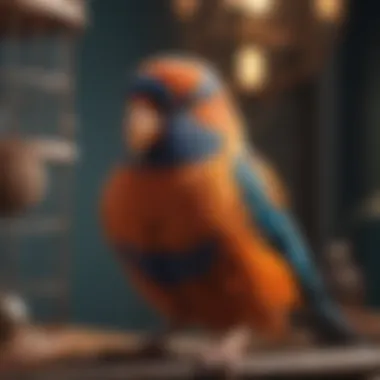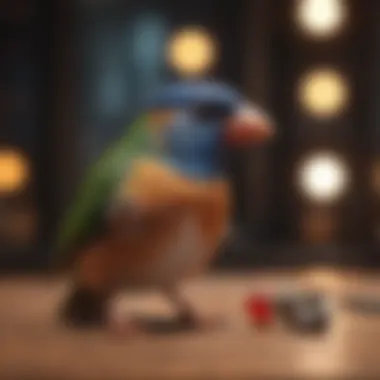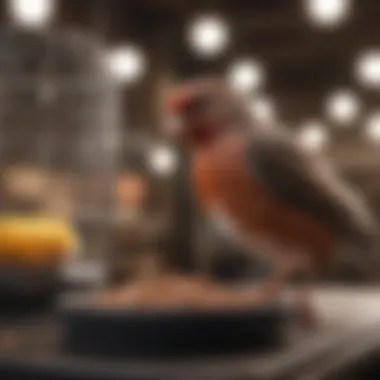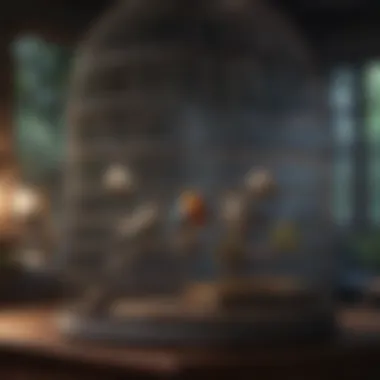Essential Accessories for Cage Birds' Care


Intro
Caring for cage birds requires a nuanced understanding of their specific needs. These feathered companions thrive in environments that are not only safe but also stimulating. This necessitates a careful selection of accessories that cater to their physical and psychological well-being. In this article, we will explore various essential accessories, including perches, toys, and feeding equipment, tailored for different bird species.
The objective is to give bird owners informed options that enhance the quality of life for their pets. This discussion will focus on the need for comfort, safety, and engagement, which are vital for any bird’s overall well-being.
Care Tips
Creating a conducive habitat for birds goes beyond just providing food and water. Here are some keys to ensuring that the environment is healthy and happy.
Daily Care Routines
Establishing a daily care routine is vital. Each day, fresh water should be provided. Clean food bowls, perches, and toys regularly to prevent bacterial growth. Observing your bird’s behavior daily can also signal any issues early on.
Cage Setup and Maintenance
Select an appropriately sized cage based on the species. For example, finches require more horizontal space for flight, while cockatiels benefit from vertical space. Ensure that perches are made of various materials and sizes to maintain foot health. Regularly inspect the cage for wear and tear.
Hygiene and Cleaning Practices
Maintaining hygiene is crucial to preventing disease. Use a non-toxic cleaner for deep cleaning cages. Remove droppings and food remnants daily to keep the area hygienic. Pay special attention to corners as these often retain debris.
Seasonal Care Adjustments
Birds are sensitive to temperature changes. In winter, ensure they have a warm spot in the cage away from drafts. In summer, provide ventilation and shade. Being adpated to seasonal changes can significantly improve a bird’s health.
Behavioral Insights
Understanding bird behavior is essential for creating a harmonious environment.
Understanding Bird Body Language
Birds communicate through body language. Fluffed feathers might indicate cold or discomfort, while rapid wing flapping can be a sign of excited energy. Spend time observing these behaviors to respond appropriately.
Common Behavioral Issues and Solutions
Some birds may develop behavioral issues like excessive screaming or feather plucking. Offering a variety of toys can mitigate boredom. Behavioral problems often stem from a lack of stimulation or attention, so engage with your bird regularly.
Positive Reinforcement Techniques
Reinforce good behavior with treats. This encourages a bond while teaching desired actions. Avoid negative reinforcement. Instead, focus on creating positive experiences that motivate your bird to learn new behaviors.
Social Interaction Needs
Birds are social creatures. Mimicking their natural environment requires interaction, both with humans and other birds. This interaction increases their mental stimulation and can reduce stress.
Nutrition Guides
Feeding provides more than just sustenance; it supports health and well-being.
Essential Diet Components
A balanced diet typically includes seeds, fresh fruits, and vegetables. Consult resources like Wikipedia or Britannica for detailed dietary needs specific to each species.
Safe and Toxic Foods
It’s vital to be aware of what foods are safe. Common hazardous items include avocado, chocolate, and caffeine. Always research or consult a vet for safe dietary practices.
Supplements and Treats
Consider nutritional supplements if needed. These can include vitamins, minerals, and occasional treats for training. Always use treats in moderation to ensure health benefits.


Feeding Strategies for Different Species
Tailor feeding to your bird’s specific needs. Some birds may require more protein, while others thrive on high-fiber diets. Understanding these differences can help prevent obesity and other health issues.
Wellness and Health
Regular health checks form the foundation of responsible pet bird ownership.
Routine Health Checkups
Schedule annual vet visits to catch potential health concerns early. Routine exams can incorporate physical assessments and behavioral observations.
Identifying Symptoms of Illness
Common symptoms include changes in dropping consistency, appetite, or activity levels. Recognize these signs early to take timely action.
Preventative Care and Vaccinations
Discuss with a veterinarian about necessary vaccinations. Preventive care includes maintaining a clean habitat and ensuring proper nutrition.
Mental and Emotional Well-being
Mental health is as vital as physical health. Ensure your bird has ample toys and socialization opportunities to keep them psychologically fit.
Enriching Activities
Engagement through various activities plays a significant role in a bird's happiness.
Toys and Playtime Ideas
Provide an assortment of toys, such as swings and puzzles. Rotate toys regularly to maintain novelty and excitement.
Training and Tricks
Teaching birds simple tricks can enhance their mental skill set. Use patience and positive reinforcement to make learning enjoyable.
Outdoor Activities and Interaction
Supervised outdoor time can be enriching and exhilarating for your bird. Using aviaries can provide them with a safe exploration area.
DIY Projects for Mental Stimulation
Creating DIY toys and activities can be an engaging experience for both owner and bird. Consider simple materials like paper towel rolls for enrichment.
Remember, investing time in understanding your bird and its needs will result in a fulfilling companionship.
Ultimately, optimizing care for cage birds is about balancing their physical health with mental engagement. Selecting the right accessories plays a key role in achieving this goal.
Prelims to Cage Bird Accessories
Cage bird accessories play a vital role in the overall health and happiness of pet birds. Understanding their importance can significantly enhance the care provided by bird owners. Accessories are not just additions to a bird's environment; they are crucial elements that meet the physical and psychological needs of various species.
Importance of Accessories
Accessories serve several purposes. First, they create a comfortable space where birds can thrive physically and mentally. Different species have diverse needs based on their natural habitats and behaviors. Thus, providing suitable accessories becomes essential. For instance, perches mimic their natural resting places, while toys offer stimulation and break the monotony of their daily routine.
Benefits to Bird Owners
The right accessories contribute to positive owner-bird relationships. Responsible owners invest in the best tools to ensure their birds’ well-being. This, in turn, reduces the likelihood of behavioral issues that arise from boredom or discomfort. Bird owners also experience satisfaction knowing they are fostering a healthy environment. An enriched setting not only nurtures the birds but also allows owners to observe more predictable and engaging behavior.
Considerations When Choosing Accessories
When selecting accessories, it is crucial to consider factors like safety, material, and size. Unsafe materials can pose health risks to birds. Therefore, one must ensure that all items are made from bird-safe materials; materials like untreated wood or natural fibers are preferable. The scale of accessories must match the size of the bird to provide comfort without overcrowding the space.


Understanding the Needs of Cage Birds
Understanding the needs of cage birds is not just a matter of keeping them alive; it involves creating an environment where they can thrive. Different species of birds have unique requirements, which can affect their health and well-being. This section delves into the physical and behavioral needs of cage birds, helping owners make informed decisions in caring for their pets.
Physical Requirements for Different Species
Every cage bird species comes with its own set of physical needs. For instance, larger birds, such as macaws and cockatoos, require bigger cages with adequate space to move freely. They also need perches at different heights to encourage climbing, which is vital for their physical fitness. Smaller birds, like parakeets, may not need as much space but require multiple perches that fit their size.
- Size of Cage: Depending on the species, a proper cage size can promote healthy movement. For a budgerigar, a cage measuring at least 30 inches long is suitable. In contrast, a cockatoo should have a cage of at least 48 inches long.
- Perch Configuration: Varying diameter perches allows birds to exercise their feet. Different materials, like natural wood or dowels, offer grip and comfort for scratching their feet and preventing foot issues.
- Humidity and Temperature: Different species have different preference for humidity and temperature, which affects their health. Generally, tropical birds prefer higher humidity levels, while some parakeets can adapt to dryer air.
Taking these physical factors into account is crucial. Failure to do so can lead to stress or health problems, thus impacting their overall quality of life.
Behavioral Aspects and Enrichment
Cage birds are intelligent animals that require mental stimulation, social interaction, and environmental enrichment. They can become bored or frustrated when their surroundings lack engagement. To promote their well-being, providing adequate behavioral enrichment is essential.
- Toys: Integrating toys in their cage helps keep birds busy. Toys that encourage chewing, climbing, or problem-solving can significantly benefit their mental state. Rotate toys regularly to maintain interest and challenge.
- Social Interaction: Birds are social creatures. Some species thrive on interaction with their owners, while others may enjoy the company of other birds. Depending on the specific species, owners may consider having multiple birds in a single cage or allowing time out of the cage for social activities.
- Training and Routine: Daily routines can enhance a bird’s confidence. Simple training exercises can not only strengthen the bond between the pet and owner but also provide a mental workout for the bird.
Birds need a balanced combination of physical and behavioral needs met to foster a happy, healthy lifestyle. Owners should take the time to understand these aspects better, ensuring that their feathered companions do not just survive, but truly thrive.
Essential Accessories for Bird Cages
Every cage bird owner must understand the significance of selecting suitable accessories for their pets' living space. With the right accessories, the cage transforms from a simple confinement into an engaging habitat that promotes the bird's well-being and natural behaviors. Essential accessories cater to the physiological and psychological needs of birds, thus enhancing both comfort and quality of life.
Choosing the right elements for a bird’s cage assists in establishing a balanced environment. Each accessory serves multiple purposes, whether it is to provide physical exercise, enrich mental stimulation or ensure hygienic conditions for feeding and hydration. Therefore, comprehensive knowledge on various accessories available enables owners to make informed decisions, keeping in mind the unique requirements of different bird species.
Proper selection also affects a bird's behavior and health. Inappropriate accessories can result in stress, boredom, or physical ailments. Consequently, being well-versed in the essential accessories ensures each pet thrives within its enclosure. This section will delve into four key categories of accessories: perches, feeding tools, water sources, and toys. Each category plays a crucial role in maintaining the health and happiness of cage birds.
Types of Perches: A Critical Element
Perches are fundamental accessories that serve as vital resting and exercise spots. Selecting the appropriate type of perch is essential for the well-being of birds. Generally, perches come in varied materials and shapes, each affecting birds differently. For example, natural wood perches provide a more comfortable texture for birds’ feet than plastic alternatives. Additionally, varying the thickness of perches is crucial, as birds benefit from different diameters that help exercise their feet muscles and prevent foot problems.
When arranging perches in a birdcage, owners should consider the spacing and height. Ideally, perches should be positioned at various heights to encourage climbing and exercise. Mixing perches of different materials and textures can also prevent boredom. Furthermore, it may be beneficial to avoid placing perches directly over food and water containers to prevent waste from contaminating these vital resources. Owners should regularly inspect perches for wear and replace them as needed to ensure continued comfort and safety.
Feeding Accessories for Optimal Nutrition
Feeding accessories are crucial for maintaining proper nutrition. The varied design of food dishes and dispensers caters to different feeding preferences of birds. Ideally, the chosen feeders should be easy to clean and refill. For smaller birds, shallow dishes minimize the chance of contamination from droppings, while larger birds may require sturdier feeding platforms to accommodate their size and strength.
Additionally, utilizing foraging dishes can stimulate a bird’s natural instincts. Foraging encourages them to waste time and effort searching for food, which can reap mental health benefits. It is also wise to opt for food containers made from non-toxic materials. Opt for products categorized as bird-safe to avoid any health issues from ingesting harmful substances.
Water Sources: Ensuring Clean Hydration
Clean hydration plays an integral role in the overall health of cage birds. Water sources should be easy for birds to access, ensuring they stay hydrated throughout the day. Water bowls must be shallow to prevent drowning risks, and owners should change the water daily to maintain necessary hygiene.
There are automatic water dispensers available, which offer a steady supply of clean water. However, even with these highly efficient solutions, daily checks are recommended to ensure there are no blockages or leaks. Regardless of the chosen method, ensuring birds have access to fresh, clean water should always be a top priority in any cage environment.
Toys and Their Role in Mental Stimulation
Providing toys is essential for the emotional well-being of cage birds. They offer necessary mental stimulation, importing an opportunity to engage in social behaviors that mimic their natural habitats. Toys come in an array of materials, shapes, and sizes. Some toys encourage physical activity, while others promote problem-solving and interaction.
Rotating toys can help prevent boredom. Birds tend to lose interest when they constantly see the same items. Furthermore, toys that can be shredded or manipulated serve as constructive outlets, channeling energy into appropriate activities rather than destructive behaviors.
It is also vital to select toys that are safe and free from harmful materials. Regular inspections are necessary to ensure toys remain in good condition, avoiding risks due to wear and tear. Ensuring a variety of engaging toys will ultimately keep a bird stimulated and happy, contributing to a balanced and enriched living environment.
Safety Considerations in Accessory Selection
When it comes to the care of cage birds, selecting safe accessories is paramount. Birds are sensitive creatures that depend on their environment to remain healthy and stress-free. The wrong choice of accessories can lead to health hazards, injuries, or behavioral issues. Therefore, understanding the safety aspects when choosing items such as perches, toys, and feeding tools is essential for any responsible bird owner.
Material Safety: What to Avoid
Selecting safe materials is vital. Many items in pet stores are made from substances that can be harmful to birds. For instance, avoid accessories made from treated wood, which often contains chemicals. Metal accessories can also present problems; coated metals may chip, exposing toxic elements beneath. Furthermore, plastics may contain BPA or phthalates, which are harmful if ingested.


Recommended materials include:
- Natural wood: Free from chemical treatments and offers a familiar texture.
- Stainless steel: Non-toxic and durable, ideal for food and water containers.
- Safe paints and dyes: If colored, ensure products use bird-safe finishes.
Size and Scale of Accessories
The size of accessories plays a crucial role in the well-being of birds. Items that are too large can restrict movement, while those that are too small may lead to injuries or stress. Always keep in mind the species of your bird; larger breeds require more substantial equipment compared to smaller ones.
When measuring for perches or toys, be aware of:
- Diameter of perches: Should suit the bird's foot size. For example, budgerigars prefer thinner perches, while larger parrots need thicker ones for better grip.
- Height and width of the cage: Accessory size must correspond with the cage dimensions to prevent crowding.
- Weight of toys: Heavier items might cause injuries if they fall during play.
"Choosing the right size and material for bird accessories enhances both safety and comfort, creating an ideal habitat for your feathered companion."
With these considerations in mind, bird owners can ensure that their pets enjoy a safe and enriching environment. Remember, a well-informed choice in safety can prevent accidents and create a nurturing space for your bird.
Creating an Enriching Environment
Creating an enriching environment for cage birds is vital for fostering their well-being and happiness. This aspect often involves integrating various accessories that cater to the physical and mental needs of birds. A well-thought-out aviary setup can substantially reduce stress and behavioral issues, promote natural instincts, and contribute to overall health.
Layering Accessories for Depth
Layering accessories within a bird's cage adds complexity to their environment. This complexity can mimic natural habitats, providing birds with more opportunities to explore and interact. By layering items such as perches, ladders, and swings, you encourage your bird to exercise and engage in natural behaviors like climbing and browsing.
Consider the height and spacing of these accessories. Higher perches allow birds to feel secure, while lower items invite exploration. Positioning food and water dishes at various levels can also stimulate movement throughout the cage. Use a mix of textures and materials to create interest. For example, wood perches differ significantly from plastic ones in feel and grip, enhancing tactile stimulation.
Changing Accessories and Their Impact
Change is crucial in maintaining an enriching environment for cage birds. Regularly rotating or adding new accessories can help keep your bird engaged and prevent boredom. Birds are naturally curious, and introducing fresh elements can pique their interest and encourage exploration.
It’s important to observe how your bird interacts with new items. Some birds may enjoy new toys immediately, while others might need time to adjust. Ensuring a variety of toys and accessories also allows your bird to express its preferences.
"Birds thrive on environmental diversity. Regular changes can reduce stress and promote overall happiness."
Regular Maintenance and Care of Accessories
Regular maintenance and care of cage bird accessories is crucial for the health and happiness of your avian companions. Keeping the environment clean and the accessories in good condition directly impacts the wellbeing of birds. Regular upkeep prevents the buildup of harmful bacteria that can lead to health issues, ensuring a safe living space. Additionally, well-maintained accessories can enhance the overall enjoyment and stimulation birds receive from their environment.
Cleaning Practices for Health
Cleaning the accessories in a bird's cage is not just about aesthetics; it is an essential practice for maintaining health. Perches, food and water dishes, and toys should be cleaned frequently to eliminate pathogens. Here are some effective practices:
- Daily Wipe-Downs: After feeding, wipe down bowls and remove any uneaten food. This helps prevent mould and bacteria growth.
- Weekly Deep Cleaning: Remove all items from the cage, clean them with safe bird-friendly solutions, and ensure everything is thoroughly dried.
- Use Non-Toxic Cleaners: It is advisable to use vinegar and water solutions or commercial bird-safe cleaners. Avoid bleach or ammonia, as these can be harmful.
Incorporating these routines into your schedule is essential. A clean environment leads to healthier birds, which in turn means happier pets.
Inspecting Accessories for Wear and Tear
Regular inspection of accessories is equally vital in ensuring the longevity of each item and the safety of your birds. Accessories can wear down over time due to usage, resulting in sharp edges or breakage. Here are key points to consider:
- Check Perches: Look for splinters or wear that may hurt your bird's feet. Replace any perches that seem compromised.
- Examine Toys: Toys should be free of frayed ends and loose parts which birds could ingest. Properly assess their durability.
- Assess Food and Water Dishes: Ensure that no cracks or sharp edges are present. Such issues can lead to injuries.
"Maintaining a thorough routine of cleaning and inspection not only prolongs the life of the accessories but also safeguards your bird's health."
Creating a shared responsibility for these maintenance routines is vital. Each action taken towards regular upkeep of bird accessories significantly contributes to a better quality of life for your feathered friends. Investing time in this area pays off greatly, both in the long-term health of the birds and the overall aesthetic of their environment.
The End: Enhancing the Life of Your Bird
In this article, we have explored the various accessories that play a significant role in the care and well-being of cage birds. The conclusion synthesizes the information and emphasizes several important elements that impact the quality of life of these pets.
Firstly, choosing the right accessories such as perches, toys, feeding equipment, and clean water sources is critical. Each element must be tailored to the specific needs of the bird species. Providing appropriate perches with varied materials and sizes can greatly affect their foot health. A diverse range of toys can stimulate mental activity and prevent boredom, which is essential for their psychological well-being.
Similarly, ensuring consistent access to clean water and proper nutrition directly affects their physical health. Feeders should be designed to minimize waste and contamination. Owners are encouraged to regularly evaluate their birds' accessories to ensure they remain safe and suitable.
Another key aspect is the maintenance of these accessories. Implementing a routine cleaning process helps in preventing the spread of illness among birds. Inspecting for wear and tear cannot be overstressed. Birds often chew and scratch their accessories, so regular inspections will keep their habitat safe.
A well-cared-for environment enhances the bird's life quality. By considering all the previously discussed factors, owners contribute significantly to their pet's happiness and longevity. The bond cultivated through proper care and attention not only ensures optimal health but enriches their companion experience.
"Regular assessment of cage accessories is pivotal for maintaining a healthy and stimulating environment for your bird."















